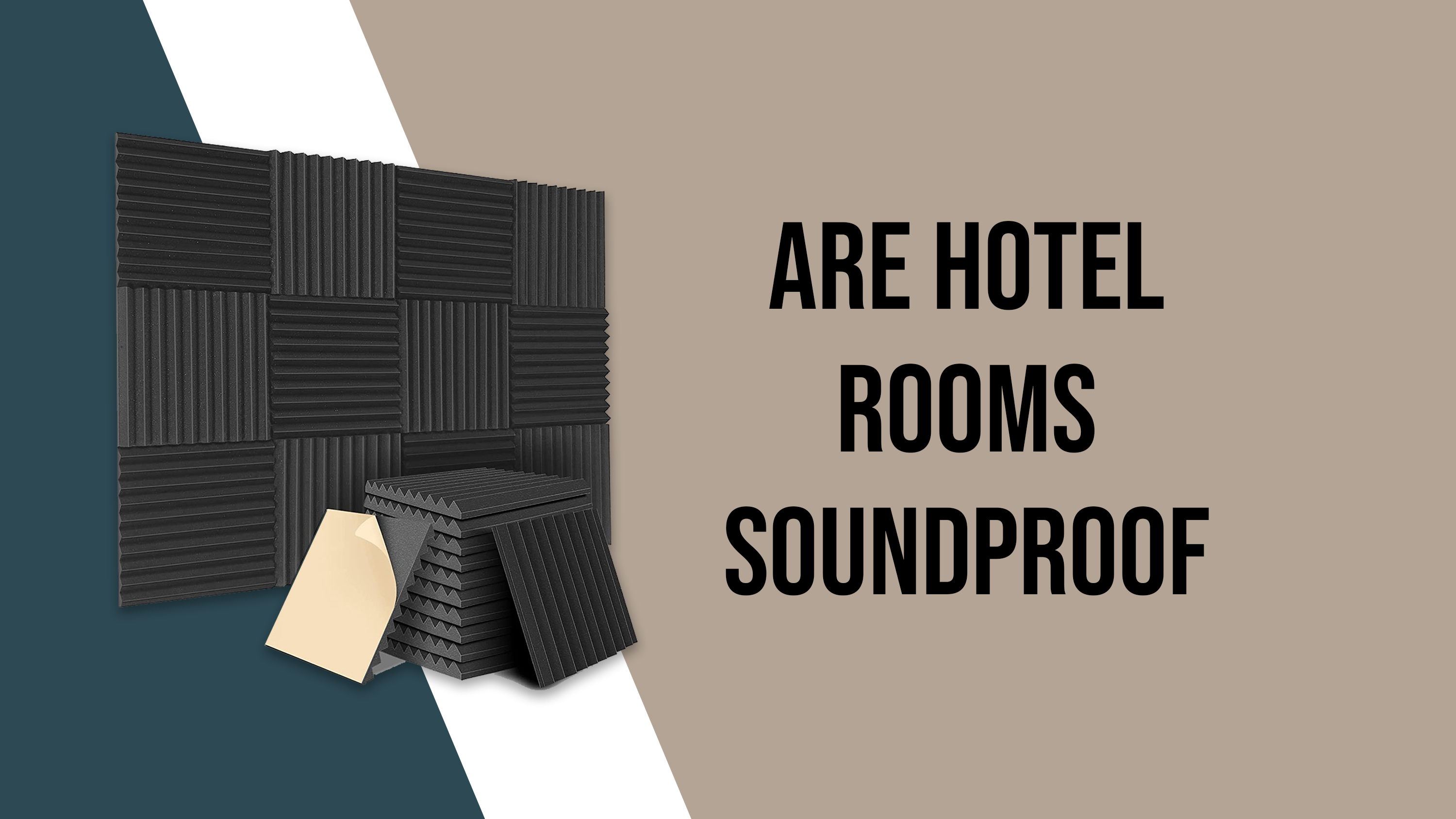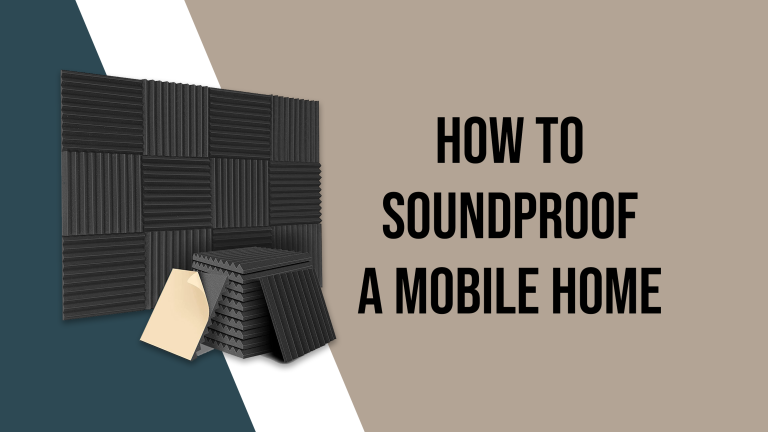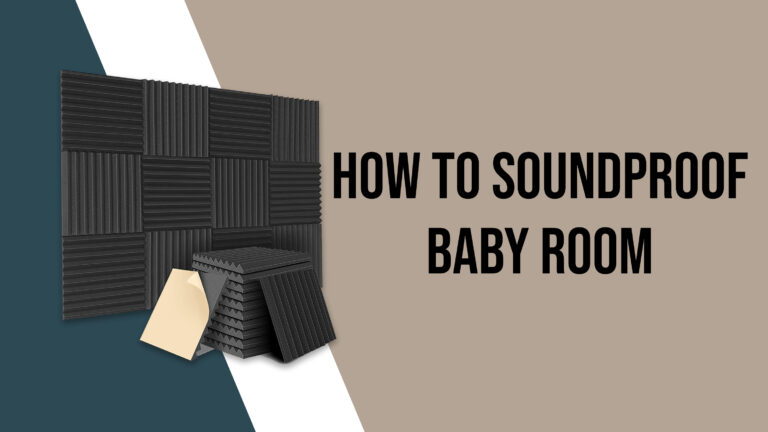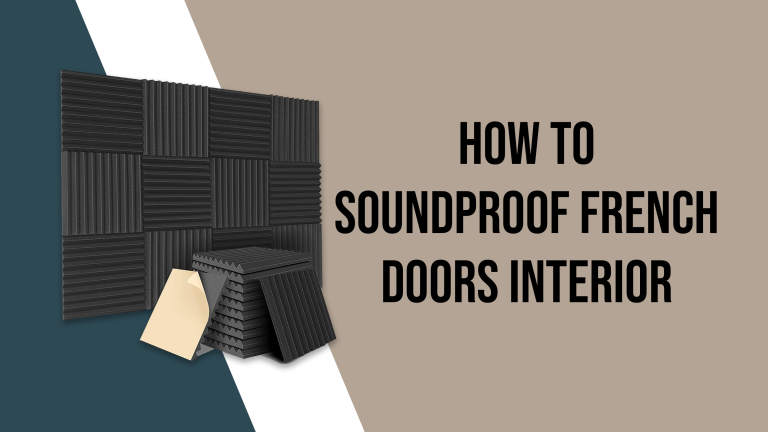Are Hotel Rooms Soundproof
When booking a hotel room, many travelers have one major concern: noise. Whether it’s the sound of traffic outside, the chatter of other guests, or even just the hum of the air conditioning, unwanted noise can ruin a good night’s sleep and make for a less-than-relaxing vacation. One potential solution to this problem is to book a room that is advertised as being “soundproof.” But what exactly does that mean, and can you really rely on it?
You can Soundproof a Baby Room, Hurricane Windows, Mobile Home, Basement for Band Practice and French Doors easily.
In this article, we’ll take a closer look at what it means for a hotel room to be soundproof, and explore some of the factors that can affect the level of soundproofing in a given room.
Are Hotel Rooms Soundproof?
Factors such as the type of windows, the location of the room, the age of the hotel, the type of flooring, and the type of walls can affect the level of soundproofing in a hotel room. To minimize unwanted noise, it is best to choose a room that is located away from busy roads or airports, on a higher floor and with soundproof windows. Additionally, you can pack a white noise machine or earplugs to help block out unwanted noise.
Factors that Affect Soundproofing
There are a number of factors that can affect the level of soundproofing in a hotel room. These include:
-The type of windows:
Single-pane windows, for example, are not as effective at blocking outside noise as double-pane windows or windows that are specially designed to be soundproof.
-The location of the room:
Rooms that are located near busy roads or airports, for example, are likely to be louder than rooms that are located in quieter areas of the hotel.
-The age of the hotel:
Older hotels may not have been built with soundproofing in mind, and may not have been upgraded to include modern soundproofing measures.
-The type of flooring:
Hardwood or tile floors, for example, are not as good at blocking sound as carpeted floors.
-The type of walls:
Drywall and other types of walls can be less effective at blocking sound than thicker, denser walls made of materials like concrete or brick.
Measures that can be taken to improve soundproofing
While you can’t always control the factors that affect soundproofing in a hotel room, there are a few things you can do to help reduce unwanted noise:
- -Choose a room that is located away from busy roads or airports.
- -Book a room that is located on a higher floor.
- -Choose a room that has windows that are designed to be soundproof.
- -Pack a white noise machine or earplugs to help block out unwanted noise.
Why soundproof hotel rooms are a sound investment?
Soundproof hotel rooms are a sound investment for several reasons:
Increased guest satisfaction:
Guests who have a good night’s sleep in a quiet and peaceful room are more likely to have a positive experience and return to the hotel in the future.
Positive reviews and ratings:
Guests who are satisfied with the level of soundproofing in their hotel room are more likely to leave positive reviews and ratings, which can attract more customers and increase revenue.
Competitive advantage:
Hotels with soundproof rooms can differentiate themselves from other hotels in the area, making them more attractive to potential guests who are concerned about noise levels.
Cost-effective:
While soundproofing hotel rooms can be an initial investment, it can save money in the long run by reducing the need for soundproofing in the future and increasing guest satisfaction.
Brand reputation:
Having soundproof rooms can help the hotel establish its brand reputation as a premium, peaceful and comfortable place to stay.
Business travelers:
Business travelers are more likely to choose a hotel that can guarantee a quiet and peaceful room where they can work or rest comfortably, it can also help to attract more corporate clients.
Overall, investing in soundproof hotel rooms can bring many benefits for the hotel, such as increasing guest satisfaction, positive reviews, competitiveness, cost-effectiveness, brand reputation and can attract more corporate clients.
How to soundproof hotel rooms?
To soundproof hotel rooms, several measures can be taken such as:
-Installing double-paned windows or windows that are specially designed to be soundproof.
-Using sound-absorbing materials such as heavy curtains, carpeted floors and soundproofing insulation.
-Designing the hotel layout in such a way as to reduce the amount of sound that can travel between rooms, such as placing rooms that face busy streets on higher floors or farther away from the source of the noise.
-Using thicker walls made of materials like concrete or brick which are denser and more effective at blocking sound than drywall.
- Soundproofing the doors with weather stripping or door sweeps.
- -Soundproofing the ceiling with acoustic tiles or soundproofing insulation.
- -Consulting with professionals in the field of acoustics and soundproofing for more advanced techniques.
Can You Soundproof A Hotel Room On Your Own?
It is possible to make some DIY soundproofing adjustments to a hotel room, but it is unlikely that you will be able to fully soundproof the room on your own. Some DIY soundproofing options include:
- Closing and locking windows to prevent outside noise from entering the room.
- Using earplugs or a white noise machine to help block out unwanted noise.
- Using heavy curtains or blankets to cover windows and doors to help block out light and sound.
- Placing furniture such as bookshelves or sofas against walls to help absorb sound.
However, for a more effective soundproofing, it is recommended to consult with professionals in the field of acoustics and soundproofing for more advanced techniques.
FAQ’s
How are hotels so soundproof?
Hotels are not completely soundproof, but they are designed to minimize the amount of sound that can penetrate from the outside or from other parts of the hotel. This is done through a variety of soundproofing measures such as:
- -Using thicker walls made of materials like concrete or brick which are denser and more effective at blocking sound than drywall.
- -Installing double-paned windows or windows that are specially designed to be soundproof.
- -Using sound-absorbing materials such as heavy curtains, carpeted floors and soundproofing insulation.
- -Designing the hotel layout in such a way as to reduce the amount of sound that can travel between rooms, such as placing rooms that face busy streets on higher floors or farther away from the source of the noise.
Can you hear through walls in hotel?
It depends on the construction and soundproofing measures of the hotel. In general, newer hotels with thicker walls and soundproofing measures will have better sound insulation than older hotels. However, it is still possible to hear some noise coming from the adjacent rooms, especially if the walls are thin or not soundproofed.
Why are hotel rooms so quiet?
Hotel rooms are often quiet because of the soundproofing measures that are in place, such as thick walls, soundproof windows and sound-absorbing materials. Additionally, many hotels are designed with a layout that helps to reduce the amount of sound that can travel between rooms, such as placing rooms that face busy streets on higher floors or farther away from the source of the noise.
How do you make a hotel room soundproof?
It is difficult to fully soundproof a hotel room, but there are steps that can be taken to improve the sound insulation:
- -Close and lock the windows to prevent outside noise from entering the room.
- -Use earplugs or a white noise machine to help block out unwanted noise.
- -Request a room that is located on a higher floor or farther away from the source of the noise.
- -Use heavy curtains or blankets to cover windows and doors to help block out light and sound.
What to do if people are loud in a hotel?
If you are being disturbed by loud people in a hotel, there are a few steps you can take:
- -Speak to the hotel staff and let them know of the disturbance, they may be able to move you to a different room or ask the other guests to be quieter.
- -Use earplugs or a white noise machine to help block out unwanted noise.
- -Call the front desk and ask to speak with a manager if the noise continues after speaking with the hotel staff.
What is the quietest floor in a hotel?
The quietest floor in a hotel can vary depending on the location of the hotel and the layout of the rooms. In general, higher floors are usually quieter because they are farther away from street level noise. Additionally, rooms that are located away from elevators, ice machines, and other sources of noise may be quieter.
How do you sleep in a loud hotel?
If you are having trouble sleeping in a loud hotel, there are a few things you can do to help block out unwanted noise:
- -Use earplugs or a white noise machine to help block out unwanted noise.
- -Close and lock the windows to prevent outside noise from entering the room.
- -Use heavy curtains or blankets to cover windows and doors to help block out light and sound.
- -Request a room that is located on a higher floor or farther away from the source of the noise.
Are hotel walls thick?
It depends on the hotel and the age of the construction, in general, newer hotels have thicker walls which are denser and more effective at blocking sound than older hotels. However, it is not certain that all hotel walls are thick.
Can you fully sound proof a room?
It is difficult to fully soundproof a room. While certain measures such as thicker walls, soundproof windows and sound-absorbing materials can be taken to reduce the amount of sound that can penetrate a room, it is unlikely that a room can be completely soundproofed.
Do hotels have noise machines?
Some hotels may have noise machines available upon request or in certain rooms, but it is not a common feature in all hotels.
Do hotels block signal?
Some hotels may have signal-blocking technology in place to prevent guests from accessing certain websites or services, but this is not a universal feature in all hotels.
What absorbs noise in a room?
Materials that absorb sound can help to reduce the amount of noise in a room. Some materials that are effective at absorbing sound include:
- Heavy curtains or drapes
- Carpeted floors
- Sound-absorbing insulation
- Furniture such as bookshelves and sofas
- certain types of wall coverings like acoustic panels
- Plants and soft furnishings
These materials work by converting sound energy into heat energy, which helps to reduce the amount of sound that can travel through a room.
Conclusion
While you may not be able to find a completely soundproof hotel room, there are steps you can take to minimize the amount of unwanted noise you’ll be exposed to. By understanding what the term “soundproof” means, and being aware of the various factors that can affect soundproofing in a hotel room, you’ll be better equipped to choose a room that will give you the quiet and peaceful stay you’re looking for. Remember, for a comfortable and sound sleep, you can always look for hotels that have soundproof windows, higher floors and also pack white noise machines or earplugs to block out unwanted noise.







